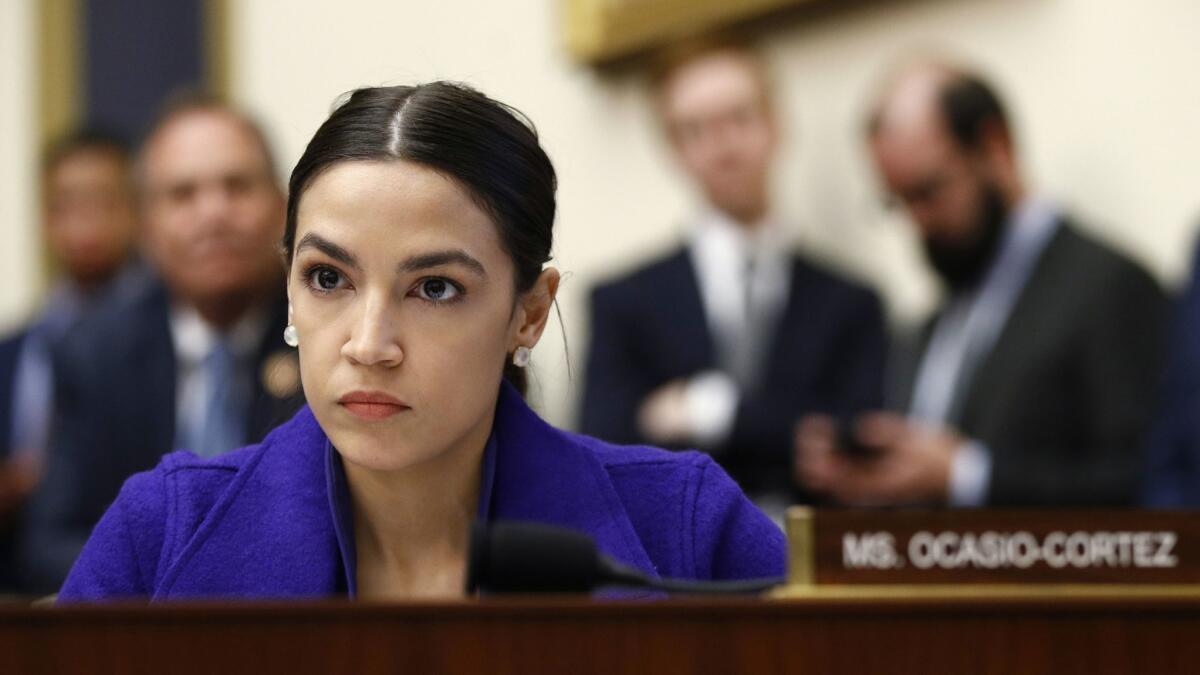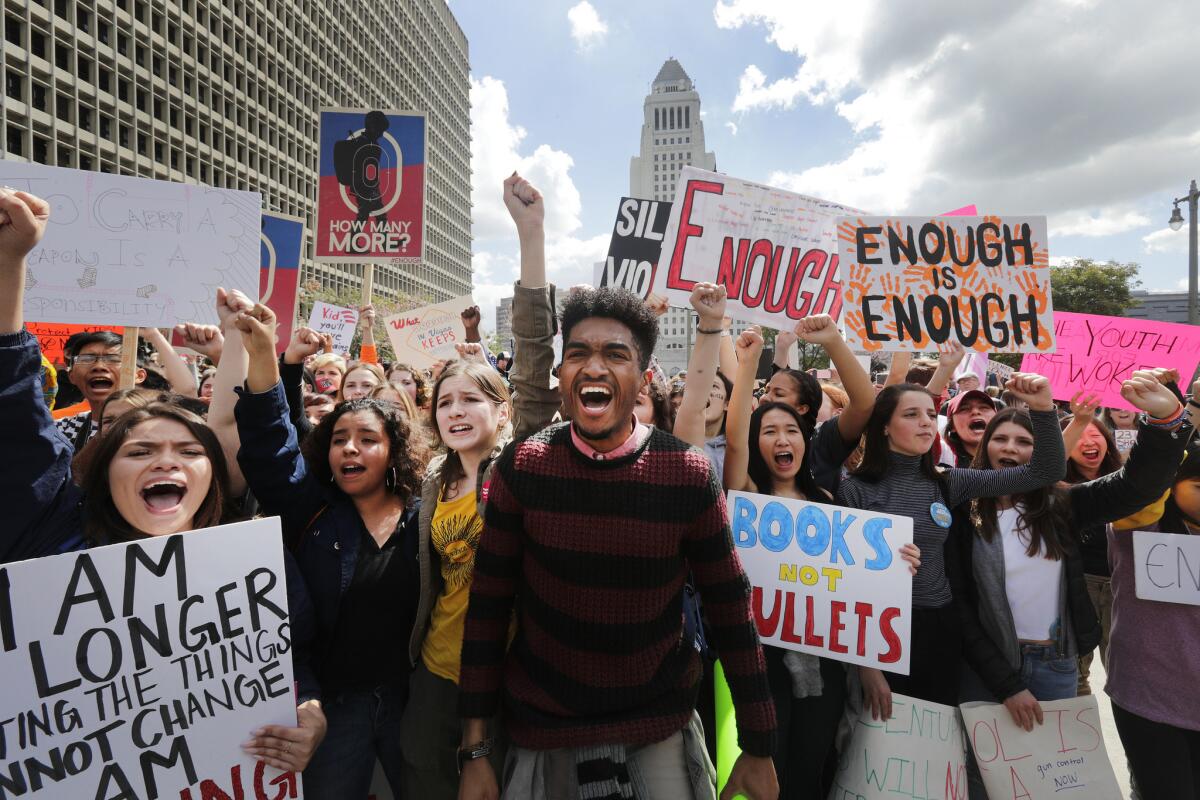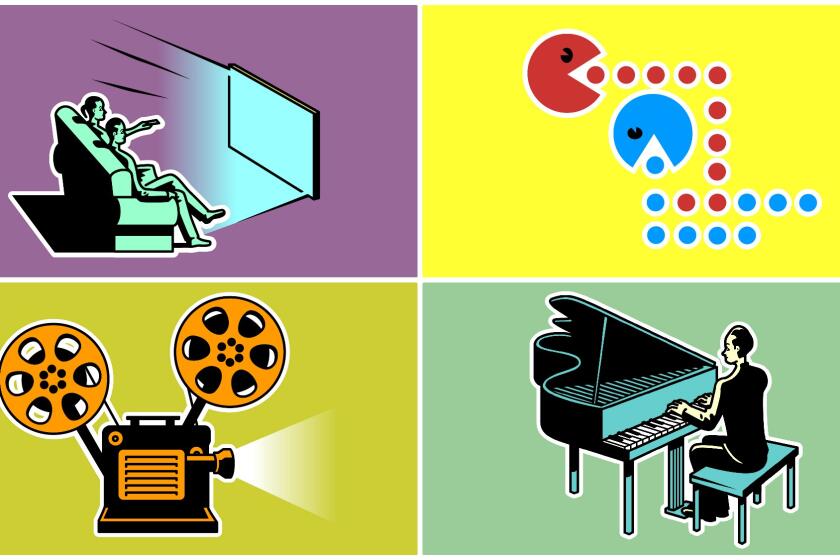Best of 2019 culture: OK Gen Z, the boomers were listening this year, sort of

- Share via
Her voice is weary yet chilling, telling us she is not complicit in a world edging toward destruction. She’s still in her teens, an inheritor of generations leaving her the burdens of global warming, economic inequality and a ravenous social media that thrills her even as it exploits and strips away the tender gifts of her youth.
Zendaya as Rue Bennett in the HBO drama “Euphoria” is a prescription-drug-addicted high schooler wandering through the wreckage of sexting, statutory rape, body shaming, mass shootings and lives playing out on smartphones, where avatars and parallel realities prompt one of her friends to muse: “I don’t think I have an attention span for real life anymore.”
“Euphoria” is a stark dive into Gen Z, those born into a post-9/11 planet of rising tides, starving polar bears, TikTok videos, selfies, invasive algorithms and the specter of the YouTube star. They are the latest iteration in an America whose sense of itself is often marked by generational divides between baby boomers, Gen Xers, millennials and teens like Greta Thunberg, a 16-year-old Swedish climate activist who admonished Congress and U.N. world leaders for not doing a better job at preserving the planet.

It has been a year of skirmishes between young and old. From Rep. Alexandria Ocasio-Cortez jolting C-SPAN with her progressive politics to the resurfacing (yes, really) of the “Brady Bunch” stars to celebrate the show’s 50th anniversary. We hang in that surreal balance. Rifts between generations are part of the natural order, but these days the differences echo with existential questions over climate change and how artificial intelligence and other technologies will reshape the way we live. Even the sisters in the Disney blockbuster “Frozen 2” must contend with environmental damage wrought by their elders.
Will Miami disappear this century under rising waters? Will the robots we create subsume us? Will we endure endless superhero reboots? Disappear into our virtual reality headsets? Will Mark Zuckerberg and his ilk mine every sacred piece of our identity? Such questions for younger generations are not rhetorical. Frankenstein is here; the “Black Mirror” is eerily ascendant.
The year in entertainment: 2019’s best movies, music, TV shows, games and more
Anxiety over the future is seeping into a cultural landscape altered in recent years by the MeToo and Black Lives Matter movements. The Trump presidency, with its impeachment troubles, anti-immigration fury and multiplying lies, has divided the country, distorting our reality and cheapening the creeds that made us a nation. One can understand why the Gen Z characters in “Euphoria” pedal through suburban neighborhoods numbed and perplexed.

“Even I don’t fully get it,” Zendaya told The Times this year. “But I understand a good percent of it. Rue says in the first episode something like, ‘We just showed up here without a map or compass.’ And it’s true, because we don’t know what the … we’re doing. Nobody actually knows what they’re doing. Imagine growing up in social media and being a child. It’s not easy. It’s confusing. And it’s uncomfortable. It’s a lot of things. It’s created by the very people that call us the zombies or whatever. It’s like, we’re the byproduct of this … , you know?”
The air between generations has been arrowed with condescension and dismissive tweets for a while. But GIFs and memes this year poking fun and outrage at baby boomers tapped into a deeper anxiety. The “OK boomer” social media tag was a jab at a post-World War II generation that millennials (born between 1981 and 1996) and Gen Zers (roughly 1997-2012) regard as entitled, affluent and blind to the consequences of decades of technological advances and environmental degradation even as dystopian films and literature have flourished.
The young viewed boomers as a cold-blooded and calculating Cersei Lannister in “Game of Thrones.” Boomers had their own characterizations of Gen Z: smartphone-swooning snowflakes. Millennials were caught in between, and Gen Xers floated in their own orbit. Suspicion played out across generations like an episode of “Succession,” where the young Roys, stewing in spoiled privilege, maneuver to outwit and unseat their cranky, toxic patriarch.
Much of the criticism against boomers was in satire and jest. Some was more pointed, including Blink-182’s song “Generational Divide” with the lyrics: “All we needed was your lifeline. (Is it better? Is it better now?).” Social media amplified and democratized “OK boomer” in a time when the calling out and muting of enemies in a growing ”cancel culture” allows younger generations to peel back the masks and reveal the prevailing sins of those in power. It is mass reckoning carried out by TikTok and Twitter.
Such an atmosphere is informing politics, college campuses and the entertainment industry. Director Martin Scorsese unleashed Marvel-fan wrath when he said that superhero movies resembled more an amusement park ride than serious cinema. His comments pointed not only to a generational gap between Scorsese and “Suicide Squad” cosplayers but to how computer graphics and special effects are reimagining movies for audiences who minute by minute live in their screens.
Cinema is rapidly changing, much like it did in the 1970s when independent filmmakers, including a young Scorsese, upended Hollywood with realism. Today, technology has given us cosmic fantasy. It has also splintered how and where we watch films and TV. Entertainment common ground between generations is shrinking as each seeks shows, podcasts and video streams that speak directly to them and less to the wider world. This raises questions about shared narratives and the future of art, expression and identity. The trend will accelerate with the streaming wars between Netflix, Disney+, Apple TV+ and other platforms.
It is a progression changed by, but as old as, time. Baby boomers cut their teeth on vinyl records and “Easy Rider”; Gen Xers had “Friends” and “Reality Bites”; millennials watched “The OC” and “The Social Network”; and Gen Z is only too familiar with news of school shootings appearing on their social media feeds and turning themselves into avatars and doppelgangers for 15-second TikTok videos.
Yet there are things that transcend and bind generations: “Star Wars.” “The Simpsons.” “Game of Thrones.” “The Office.“ Even “Mister Rogers,” portrayed by Tom Hanks in the new film “A Beautiful Day in the Neighborhood.”
A restlessness among the young has spread to our politics, but older generations still hold sway. Pete Buttigieg, a 37-year-old millennial, is the youngest major candidate among Democrats in a presidential race whose top contenders include Elizabeth Warren, 70, a boomer, and Joe Biden, 77, and Bernie Sanders, 78, both pre-boomers. The winds are shifting, but it may take another four years before someone born after MTV was launched moves into the White House.
The year in entertainment: 2019’s best movies, music, TV shows, games and more
Gender and cultural equations are also beginning to be redrawn along generational lines — although, like politics, not as quickly as many would like. Women made critically acclaimed films this year, including those by thirtysomething directors Greta Gerwig (“Little Women”) and Lulu Wang (“The Farewell”). But no female directors were nominated for the Golden Globes. The youngest of the five males nominated was Todd Phillips, 48, and the oldest was Scorsese, 77.
There has been incremental progress along racial lines. Shows like “Insecure,” “Atlanta” and “black-ish” explore the lives of young African Americans. A rising generation of black playwrights, including Jeremy O. Harris and Jackie Sibblies Drury, are laying bare the caustic legacy of prejudice and slavery in new and riveting language.
“Fresh Off the Boat,” now heading into its final season, paved the way not only for last year’s “Crazy Rich Asians” but the 2019 films “Always Be My Maybe” and “The Farewell,” which showed fresh ways of depicting the experiences of young Asian Americans.
And while Latino representation in pop culture is still abysmal, especially with “Jane the Virgin” ending its five-season run this year, a new generation is emerging, with pivotal roles in mainstream films going to Cuban actress Ana de Armas in “Knives Out” and Colombian actress Natalia Reyes Gaitán in “Terminator: Dark Fate.”

One of the most potent signs of youth taking over is Billie Eilish, the 17-year-old subversive who has jolted pop music with her debut electro-pulse album, “When We All Fall Asleep, Where Do We Go?” The work makes Eilish, who at times looks like an end-of-days denizen, the youngest artist to be simultaneously nominated in the major Grammy categories of song, record, album and best new artist.
Of course, each generation thinks it discovered what has already been charted by the one preceding it. “Bugs Bunny” is as sly as anything on “South Park.” Socially conscious Gen Zers may be marching against gun violence and climate change, but boomers and their elders born before 1946, including Bob Dylan and Martin Luther King Jr., protested for civil rights and against the Vietnam War. A fine line runs between self-righteousness and forgetting. Or worse, not being aware of what those younger and older than us have been through.
“The idea that youth culture is culture created by youth is a myth. Youth culture is manufactured by people who are no longer young,” Louis Menand recently wrote in the New Yorker. “When you are actually a young person, you can only consume what’s out there. It often becomes ‘your culture,’ but not because you made it. If you were born during the baby boom, you can call yourself a ‘60s person. You can even be a ‘60s person. Just don’t pretend that any of it was your idea.”
Still, each generation has its own style and aesthetic to make sense of its world, or, in the case of the rise of virtual reality, other worlds tempting us in cyberspace. As decades go by, what Gen Z innovations will be praised and admonished long after baby boomers — with their trippy playlists and fading idealism — have passed into history?
More to Read
The biggest entertainment stories
Get our big stories about Hollywood, film, television, music, arts, culture and more right in your inbox as soon as they publish.
You may occasionally receive promotional content from the Los Angeles Times.












